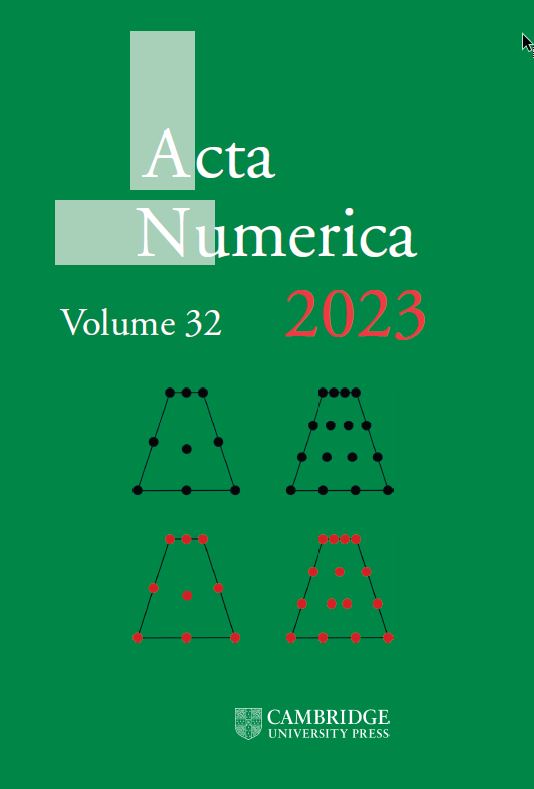The cardiovascular system: Mathematical modelling, numerical algorithms and clinical applications *
IF 11.3
1区 数学
Q1 MATHEMATICS
引用次数: 148
Abstract
Mathematical and numerical modelling of the cardiovascular system is a research topic that has attracted remarkable interest from the mathematical community because of its intrinsic mathematical difficulty and the increasing impact of cardiovascular diseases worldwide. In this review article we will address the two principal components of the cardiovascular system: arterial circulation and heart function. We will systematically describe all aspects of the problem, ranging from data imaging acquisition, stating the basic physical principles, analysing the associated mathematical models that comprise PDE and ODE systems, proposing sound and efficient numerical methods for their approximation, and simulating both benchmark problems and clinically inspired problems. Mathematical modelling itself imposes tremendous challenges, due to the amazing complexity of the cardiocirculatory system, the multiscale nature of the physiological processes involved, and the need to devise computational methods that are stable, reliable and efficient. Critical issues involve filtering the data, identifying the parameters of mathematical models, devising optimal treatments and accounting for uncertainties. For this reason, we will devote the last part of the paper to control and inverse problems, including parameter estimation, uncertainty quantification and the development of reduced-order models that are of paramount importance when solving problems with high complexity, which would otherwise be out of reach.心血管系统:数学建模、数值算法和临床应用*
心血管系统的数学和数值建模是一个引起数学界极大兴趣的研究课题,因为其固有的数学困难和心血管疾病在全球范围内的影响越来越大。在这篇综述文章中,我们将讨论心血管系统的两个主要组成部分:动脉循环和心脏功能。我们将系统地描述该问题的各个方面,从数据成像采集,陈述基本物理原理,分析包括PDE和ODE系统的相关数学模型,提出合理有效的数值方法进行近似,并模拟基准问题和临床启发问题。由于心循环系统的惊人复杂性、所涉及的生理过程的多尺度性质,以及需要设计稳定、可靠和高效的计算方法,数学建模本身带来了巨大的挑战。关键问题包括过滤数据、确定数学模型的参数、设计最佳处理方法和考虑不确定性。因此,我们将在论文的最后部分专门讨论控制和逆问题,包括参数估计、不确定性量化和降阶模型的开发,这些在解决高复杂度问题时至关重要,否则这些问题将遥不可及。
本文章由计算机程序翻译,如有差异,请以英文原文为准。
求助全文
约1分钟内获得全文
求助全文
来源期刊

Acta Numerica
MATHEMATICS-
CiteScore
26.00
自引率
0.70%
发文量
7
期刊介绍:
Acta Numerica stands as the preeminent mathematics journal, ranking highest in both Impact Factor and MCQ metrics. This annual journal features a collection of review articles that showcase survey papers authored by prominent researchers in numerical analysis, scientific computing, and computational mathematics. These papers deliver comprehensive overviews of recent advances, offering state-of-the-art techniques and analyses.
Encompassing the entirety of numerical analysis, the articles are crafted in an accessible style, catering to researchers at all levels and serving as valuable teaching aids for advanced instruction. The broad subject areas covered include computational methods in linear algebra, optimization, ordinary and partial differential equations, approximation theory, stochastic analysis, nonlinear dynamical systems, as well as the application of computational techniques in science and engineering. Acta Numerica also delves into the mathematical theory underpinning numerical methods, making it a versatile and authoritative resource in the field of mathematics.
 求助内容:
求助内容: 应助结果提醒方式:
应助结果提醒方式:


